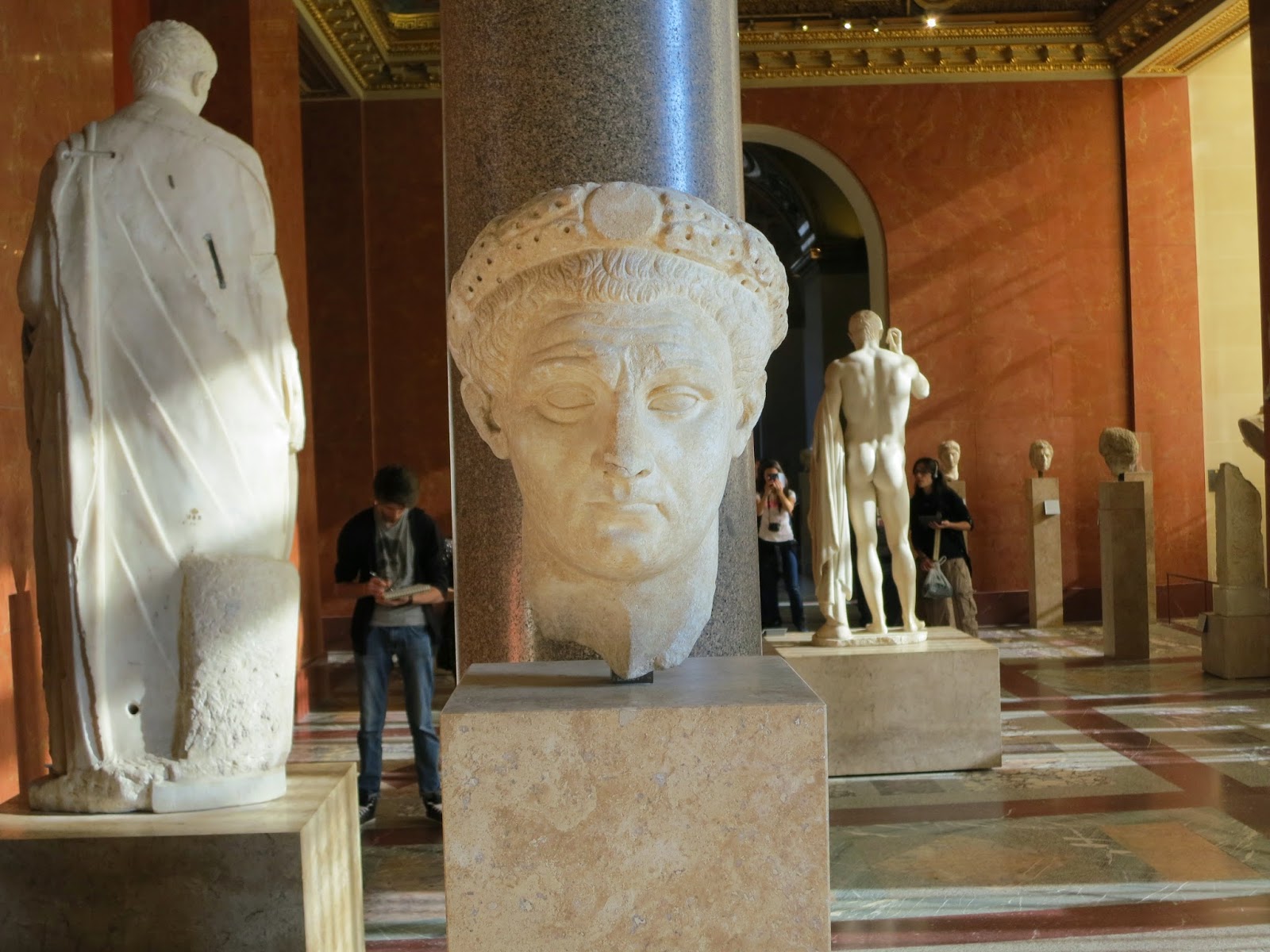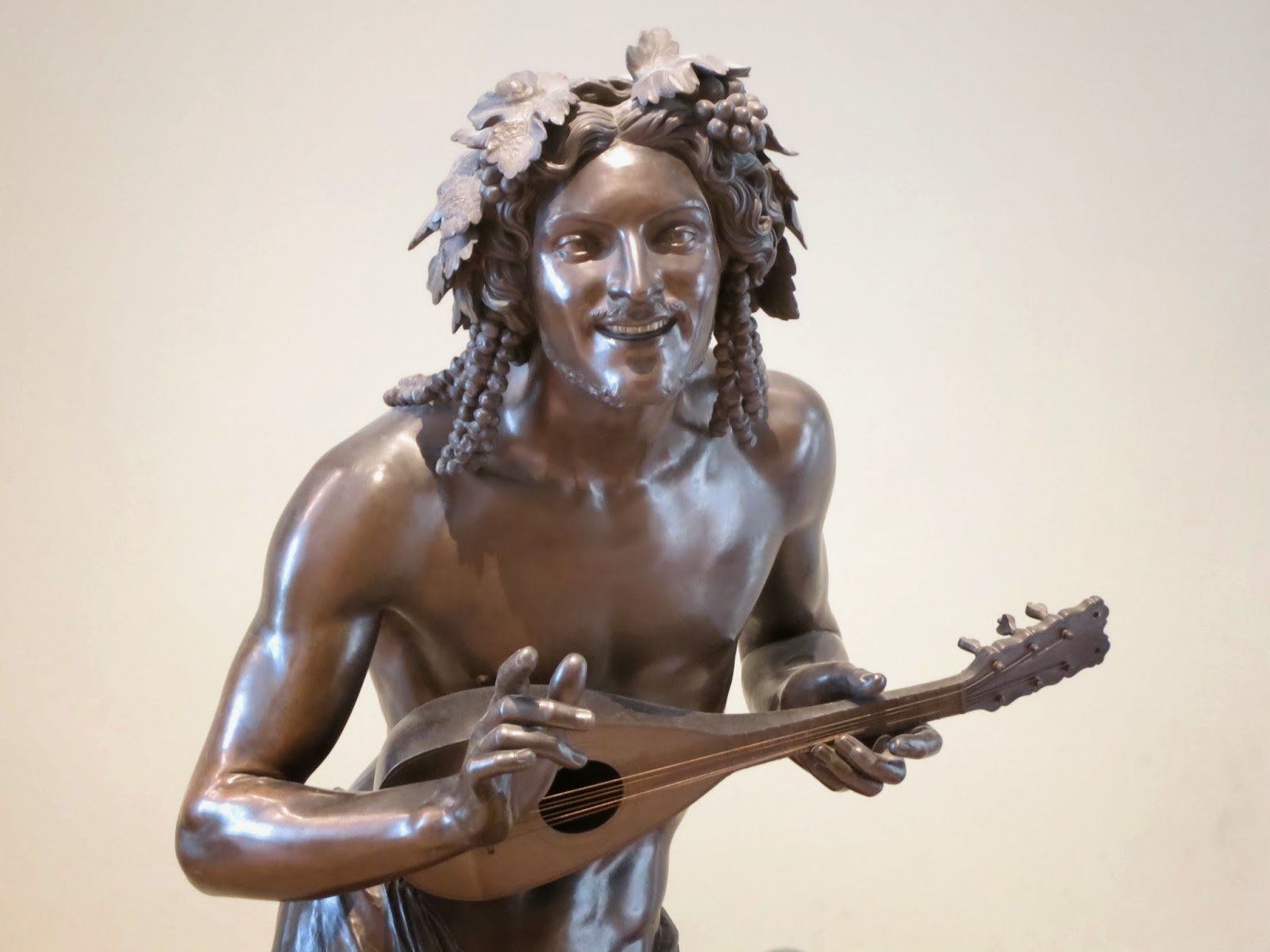 |
| Venus De Milo |
The statuary in the Louvre was somehow even more impressive
than most of the paintings. I am no art
buff, and I apologize if I don’t know the proper titles of these pieces. What I do know is the distinct impression
each made, so I will talk a little about that beneath the pictures. I hope people enjoy my interpretation.
Venus De Milo should be well known to both art buffs and
the occasional tourist. Unfortunately,
being one of the more famous sculptures lends Venus the same celebrity status
as the Mona Lisa. Tourists are jam
packed shoulder to shoulder around her, most to just get their picture and then
move on. This is an unfortunate trend
with a lot of the famous artwork we saw while in France, but this was one of
the worst examples. I had to wait a good
15 minutes before I could approach, and had much less to appreciate before
being butted out of the way by a particularly enthusiastic Korean woman.
Venus does have that slender, graceful beauty that lends
itself to a master work, but there are so many equally beautiful pieces right
in the same one. This one is a statue of
my personal favorite greek Goddess Athena, standing tall and proud with her helmet. Her hand is outstretched as if in the midst
of a casual conversation, perhaps with Apollo or one of the other gods.
This magnificent piece was the best in it section and
represents “The Rhine” river itself as a god.
Nestled against his arm is a she wolf and two babies. It took me a moment to recognize the
mythology of Rome, of Romulus and Remus who were raised by a wolf on the banks
of the river. Nestled beside the statue
are portraits of emperors, senators and even an ancient sarcophagus or two.
Here we have Atalanta, who raced men who dared to challenge
her in aspiration of her love. She seems
paused only a moment in mid step, ready to bolt.
 |
| Such grace and kindness |
 |
| Looks like my old dog |
This fellow was amusing, and I have to remark on the museum
keepers for his placement. He has such a
look as to be a haughty interest, but what was more interesting was the statue
where his eyes were cast….
This one was rather cute.
A little girl poised on the tips of her toes to whisper into the ear of
another statue.
Here we have some of the finer rooms of the Louvre, dating back from the era of Louis XIV onwards. The splendid ceiling was quite a sight in itself, such decorations and detail.
 |
| Michaelangelo's Arch |
This archway was carved by Michelangelo, but I didn’t get a good look at his
other sculptures in the room. It was
very impressive, and the only one I got to touch walking under it. All of these statues are treasures in their own right, but
these last two were my absolute favorites of all the artwork I ever saw in
France.
“Listening to the Voices.” Is a title I can clearly
remember, because this statue left a
clear impression in my mind. The image
is of Joan of Arc, dressed as a simple country maid. She looks no older than a girl of fourteen,
paused on the brink of destiny. At her
side is a set of heavy armor, her hand resting on it. The other hand is poised up to her ear, as if
to listen to the unseen voice of God that compelled her to fight for her
country.
The most remarkable things about the statue to me is the
subtle symbolism. Joan’s eyes are not
looking towards the voice but away from
it, right towards the viewer. There is
an expression of wonder in her face, of innocence and purity. She is dressed as a humble peasant, but look
closer. Nestled just beneath her dress
you can see the edge of an armored boot.
On the outside, a simple peasant girl, humble and innocent. Beneath, a hardened warrior, a woman before
her time, ready to fight for God and country.
Looking at this statue made me feel such a sense of
emotion. I couldn’t help but see this
girl awaiting her trial to be burned at the stake. The statue haunted me the more I stared at
it, because its not the armored, fierce warrior we see in so many depictions of
her. It is very much human.
This next statue’s name eludes me and I curse myself for
not knowing it, so if anyone does know, please tell me. It is a portrait of a young man in shorts,
with a lute nestled against his navel.
He rests upon a basket, with one leg crossed over the other as if
actually at peace in the place. While
one hand holds his instrument, the other is gestured out to the viewer as if he
were partway through song before something struck him and he was frozen in time
just before expressing it.
It is his face however that captures that sense of spirit
and mirth. His eyes are warm and
alive. His smile is wide, his features
friendly. Ringlets of hair cascade from
a crown of leaves. This is the very
depiction of what I think Shakespere imagined of Puck, though the statue is not
of the character himself. He is a lively
minstrel, a slight scoundrel, an imp but of the best kind. He is jolly and merry, very glad to see
you. When I stopped and saw him I had to
stare for a good five minutes and remind myself this wasn’t a real person. I don’t know if it’s just the artistry, or
the bronze/stone it was made of giving a sense of flesh; but this was the most
realistic statue I’ve ever seen.
 |
| Ah, my old friend claudius |
 |
| Augustus |
 |
| Athena |
 |
| Athena Again |
 |
| I used to be a tourist like you...then I took an arrow to the knee... |
 |
| Ow.... |
There were many other statues and impressive areas so here
are some other pictures.
No other portraits really come to mind, though we saw the
sixteenth and seventeenth century rooms so resplendent in rococo designs. This was a preview of the richness we would
see as Versailles, a haunting hint of France’s royal past. By this time though we were getting tired
of the crowds and the inside of the Louvre was starting to get increasingly
crowded. So we beat a hasty retreat
outside.
I believe I can end my thoughts on the Louvre with this
reflection. The paintings and sculptures
watch the visitor, but the visitors must have the eyes to see the artwork
winking back. Most visitors seem to lack
the depth to see and be seen, and instead choose the photo or selfie rather
than appreciation.
Still on the whole it was an unbelievable collection more beautiful than any I had ever seen. Our day was not yet done, and we still had much more yet to see.


















